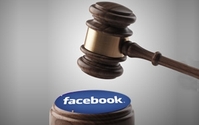 Facebook is
asking a federal appeals court to uphold a $20 million settlement of a class-action lawsuit stemming from the 'sponsored
stories' program.
Facebook is
asking a federal appeals court to uphold a $20 million settlement of a class-action lawsuit stemming from the 'sponsored
stories' program.
“A settlement is by its very nature a compromise, and compromises
never please everyone,” the social networking services company says in papers filed on Friday with the
9th Circuit Court of Appeals. “A small handful of the approximately 150 million potential class members continue to object to the compromise, but the now-standard presence of objectors does not
show that the district court abused its broad discretion in approving this settlement.”
Facebook's papers come several months after critics of the sponsored stories program asked the 9th Circuit to scrap the deal. The settlement, which
was approved by U.S. District Court Judge Richard Seeborg, resolved a class-action lawsuit alleging that Facebook's sponsored stories violates a California law about endorsements. That law says
companies need adults' permission before using their names or images in ads. When minors' names or images are used in ads, companies must obtain parental consent.
Facebook recently stopped selling “sponsored stories” ads, but now allows marketers to show people's likes to
their friends, next to ads.
While the lawsuit centered on California's law, six other
states also prohibit companies from using minors' name and images in ads without obtaining permission from parents.
The settlement requires Facebook to pay $15 each to around 600,000 users who were featured in “sponsored stories” -- ads featuring users' names and images
and shown to their friends. The deal also requires Facebook to pay several million dollars to various nonprofits and organizations.
As part of the settlement, Facebook agreed to revise its terms of service so that users state they give permission for their names and photos to be shown in
ads. Users under 18 must represent that at least one parent agrees.
That deal drew
appellate challenges from various organizations and opponents, including a group of parents. They argued that the settlement's terms -- which allow Facebook to continue using minors in ads --
authorize Facebook to continue violating state laws meant to protect minors' privacy.
Facebook counters on appeal that its ad programs don't violate any state laws, arguing that teens have a free-speech right to communicate on Facebook that they “like” brands.
“There was no clear violation of existing law but rather an ongoing, hotly litigated dispute, such that the settlement reflected a compromise that avoids for both parties the [risk and expense]
of obtaining a ruling on the merits,” Facebook argues.
The social networking
service also says that any state laws that give minors privacy protections are trumped by the federal Children's Online Privacy Protection Act. That law restricts companies' ability to collect
certain information from children who are younger than 13, but doesn't address data collection from minors between 13 and
18.
Facebook says that
the law's silence regarding teens shows that Congress intended to leave companies free to collect data from them. “Because
Congress made a considered judgment that the online activities of teenagers should not be subject to any blanket parental consent requirement, any state law that treats this issue in a manner inconsistent with this ... must yield,”
Facebook argues.
The Federal Trade Commission said earlier this year that it disagrees
with that conclusion. “Nothing in COPPA’s language, structure or legislative history indicates that Congress intended for that law to preempt state law privacy protections for people
outside of COPPA’s coverage, including teenagers,” the FTC said in a friend-of-the-court brief filed with the 9th Circuit.